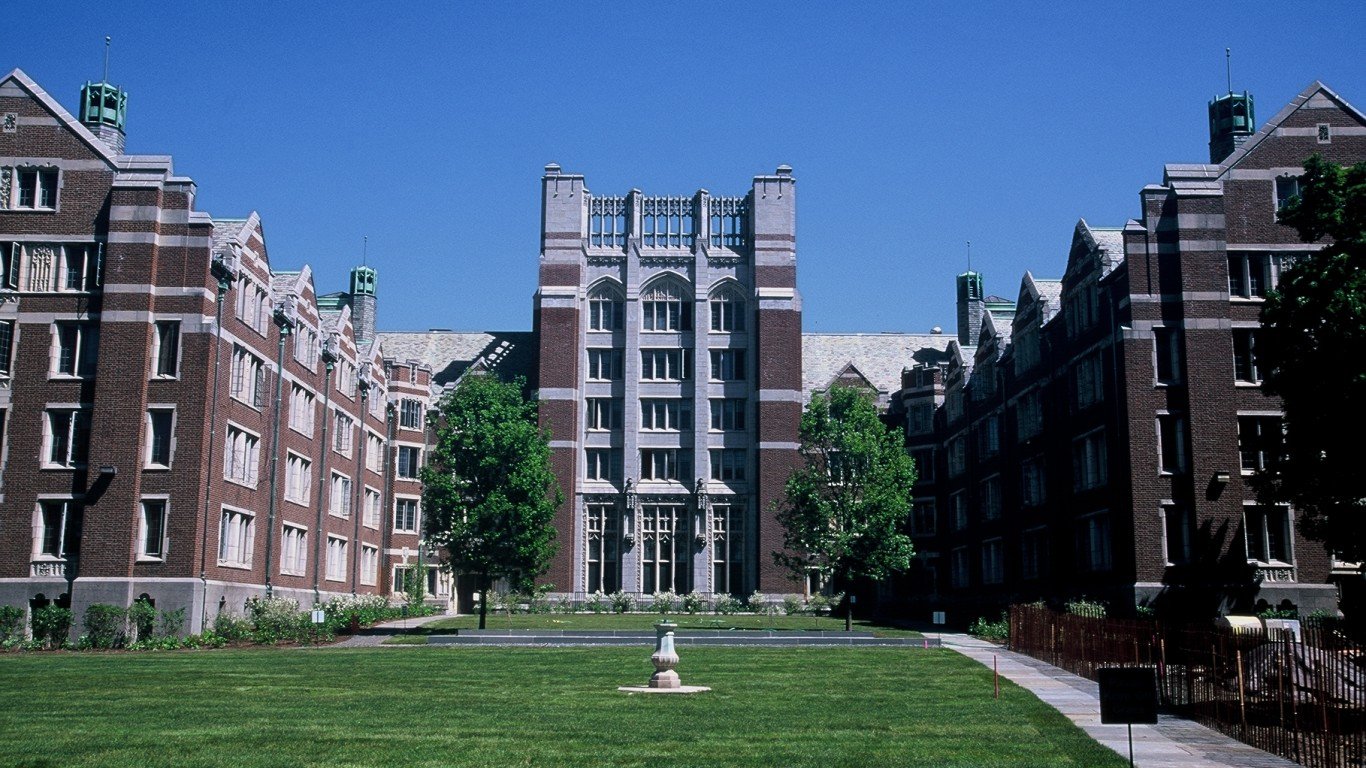

Americans with a bachelor’s degree are nearly half as likely to be unemployed as those with only a high school diploma. While earning a college degree is a proven way to reduce the likelihood of unemployment, not all undergraduate fields of study provide equally solid job security.
Using data from the U.S. Census Bureau’s 2019 American Community Survey, 24/7 Wall St. identified the college majors with the lowest unemployment rates. Across all labor force participants with a bachelor’s degree, the annual unemployment rate stood at 2.6% in 2019. Among the majors on this list, the unemployment rate at that time ranged from 1.7% to effectively zero.
It is important to note that since 2019, the U.S. job market has changed markedly, largely as a result of the COVID-19 pandemic. Unemployment soared from a multi-decade low to a high not seen since the Great Depression in just a matter of months, affecting Americans of all education levels. Here is a look at the American brands that went bankrupt during COVID.
Still, the U.S. economy appears now to be on track for a strong recovery. Many of the majors on this list prepare students for occupations that will likely remain in demand for years to come.
As student debt soars in the United States, job security in future career prospects is not the only factor for students to consider when choosing a major. Earning potential will also affect the financial footing of college graduates — and many of the most secure jobs are not necessarily high paying. All but seven majors on this list have salaries lower than the average annual salary of $63,448 among working college graduates. Here is a look at the states where people struggle most with student debt.
Click here to see the college majors with the lowest unemployment.
Click here to see our methodology.

25. Public policy
> Unemployment rate: 1.7%
> Avg. salary: $89,761
> Undergrad degree holders with a master’s or professional degree or higher: 49.6%
> Undergrad degree holders in labor force: 42,627
Public policy majors study large-scale problems, potential policies that aim to address them, and the efficacy of such policies. The major combines elements of both political science and economics, and students who select it may choose to concentrate in any number of areas, including resource management, homeland security, or local government.
Just 1.7% of the more than 42,600 labor force participants who majored in public policy are unemployed. Like most majors that lead to relatively secure occupations, public policy majors often continue their education after college. About half of all working public policy majors have a professional, master’s, or doctorate degree.
[in-text-ad]

24. Medical technologies technicians
> Unemployment rate: 1.6%
> Avg. salary: $54,038
> Undergrad degree holders with a master’s or professional degree or higher: 21.8%
> Undergrad degree holders in labor force: 193,273
Those who study to become a medical technologies technician are among the least likely to be unemployed upon entering the labor force. Jobs in the field typically entail interacting with patients, collecting specific bodily fluids for analysis and testing, inputting findings data, and notifying medical staff when immediate treatment is necessary.
Unemployment among those who majored in the field as undergraduates is just 1.6% — and may fall even lower as demand for medical technologies technicians is projected to increase at double the rate for all occupations in the United States over the next decade.

23. Electrical, mechanical, and precision technologies and production
> Unemployment rate: 1.6%
> Avg. salary: $58,706
> Undergrad degree holders with a master’s or professional degree or higher: 21.7%
> Undergrad degree holders in labor force: 20,114
Electrical, mechanical, and precision technologies and production is one of several highly specialized areas of undergraduate studies where degree holders are among the least likely to be out of work. Many who earn their degree in this field go on to work as automotive mechanics, aircraft technicians, welders, and industrial machinery workers.
There are just over 20,000 people in the labor force who majored in electrical, mechanical, and precision technologies and production — and only about 1.6% of them are unemployed.

22. Forestry
> Unemployment rate: 1.6%
> Avg. salary: $48,529
> Undergrad degree holders with a master’s or professional degree or higher: 25.8%
> Undergrad degree holders in labor force: 66,633
Forestry majors study aspects of borth environmental conservation and management to prepare for jobs that involve analysis of forest growth and preservation. Of the more than 66,600 Americans in the labor force who studied forestry, only 1.6% are unemployed.
Like many undergraduate degree programs that lead to relatively secure jobs, forestry majors often further their education after graduation. About one in every four members of the labor force with an educational background in forestry have a professional, master’s, or doctoral degree.
[in-text-ad-2]

21. Agriculture production and management
> Unemployment rate: 1.6%
> Avg. salary: $59,255
> Undergrad degree holders with a master’s or professional degree or higher: 14.9%
> Undergrad degree holders in labor force: 122,874
Agriculture production and management prepares students for careers in both the labor and management of agricultural operations, equipping them with the skills needed to run a farm. Areas of study can include quality management, supply chain management, inventory control, and equipment operation.
Though unemployment for those who study agriculture production and management is now low, it may not always be. New technologies are giving way to consolidation of farming operations in the United states, and over the next decade, demand for farmers, ranchers, and agricultural managers is projected to decline by 6%.

20. Special needs education
> Unemployment rate: 1.5%
> Avg. salary: $37,655
> Undergrad degree holders with a master’s or professional degree or higher: 60.5%
> Undergrad degree holders in labor force: 265,091
Only 1.5% of the more than quarter of a million Americans in the labor force who studied special needs education in college are unemployed. Most jobs in the field involve working with students who have any number of learning, mental, emotional, or physical difficulties in programs that are offered by public schools.
As is often the case for Americans working in education, special needs instructors typically have a two-month break during the summer.
[in-text-ad]

19. Library science
> Unemployment rate: 1.5%
> Avg. salary: $28,969
> Undergrad degree holders with a master’s or professional degree or higher: 68.2%
> Undergrad degree holders in labor force: 25,381
Library science is effectively the study of information storage, organization, and maintenance. Those who study in the field can use their skill set in a number of capacities that require these and other skills, including locating information on nearly any topic. Many who study library science become librarians. While more than 25,000 labor force participants in the U.S. majored in library science as undergraduates, most who are working as librarians did not begin studying library science until the graduate level.
The jobless rate among those who studied library science is just 1.5%. Demand for librarians is projected to grow by 5% between 2019 and 2029, slightly faster than the projected job growth across all occupations.

18. Nursing
> Unemployment rate: 1.5%
> Avg. salary: $57,925
> Undergrad degree holders with a master’s or professional degree or higher: 26.8%
> Undergrad degree holders in labor force: 2,558,871
Nursing is one of the most common areas of undergraduate study in American higher education. Many choose nursing out of a desire to help and care for the sick. The profession is one of the most secure occupations in the country. Only 1.5% of the nearly 2.6 million labor force participants who went to college for nursing are unemployed.
Demand for those who study nursing is projected to grow. According to the Bureau of Labor Statistics, jobs for registered nurses are projected to grow by 7% over the decade ending in 2029, well above the average 4% job growth rate across all occupations.

17. Biological engineering
> Unemployment rate: 1.5%
> Avg. salary: $81,670
> Undergrad degree holders with a master’s or professional degree or higher: 44.4%
> Undergrad degree holders in labor force: 65,142
Biological engineering is an interdisciplinary major that combines coursework in biology, chemical engineering, civil engineering, mathematics, and physics. Those who study biological engineering ultimately end up working in careers that aim to solve biological issues such as developing sustainable food and energy supply solutions and protecting natural resources. These jobs are among the most secure in the labor market, as just 1.5% of bio engineering majors are unemployed.
As is often the case among the fields of study on this list, bio engineering students often continue their education beyond the undergraduate level. An estimated 44% of those who majored in biomedical engineering also have a professional, master’s, or doctoral degree.
[in-text-ad-2]

16. Physiology
> Unemployment rate: 1.4%
> Avg. salary: $89,456
> Undergrad degree holders with a master’s or professional degree or higher: 55.1%
> Undergrad degree holders in labor force: 136,346
Physiology majors study the functions and mechanisms of living organisms. The degree program, which is a subset of biology, also prepares students for some of the most secure jobs in the labor force, including lab technicians, clinical trial coordinators, surgical technicians, and medical assistants. Most who major in the field go on to earn a professional, master’s, or doctorate degree, which can lead to careers in other fields, like physical therapy.
Only 1.4% of labor force participants who majored in physiology are unemployed.

15. Elementary education
> Unemployment rate: 1.4%
> Avg. salary: $28,376
> Undergrad degree holders with a master’s or professional degree or higher: 45.0%
> Undergrad degree holders in labor force: 1,411,375
Elementary education majors study to prepare for careers in both public and private elementary schools. Education is a universal basic service provided in cities and towns across the United States, and partially as a result, jobs in education tend to be relatively secure. Of the 1.4 million Americans in the labor force who majored in elementary education, only 1.4% are unemployed.
[in-text-ad]

14. Animal sciences
> Unemployment rate: 1.4%
> Avg. salary: $57,154
> Undergrad degree holders with a master’s or professional degree or higher: 33.4%
> Undergrad degree holders in labor force: 161,061
The unemployment rate among labor force participants who majored in animal sciences is just 1.4%. The major prepares students for careers in fields such as veterinary medicine, zookeeping, wildlife conservation, and farm management. As students, animal science majors study a broad range of subjects in life sciences, including animal nutritionion, reproduction, and development.
Demand for workers who studied animal science will likely only grow in the coming years. One reason is that American consumers have been spending more and more on their pets. As a result, veterinary jobs are projected to grow 16% in the decade ending in 2029, more than four times faster than the average growth across all occupations.

13. Medical assisting services
> Unemployment rate: 1.3%
> Avg. salary: $50,688
> Undergrad degree holders with a master’s or professional degree or higher: 23.7%
> Undergrad degree holders in labor force: 89,039
Medical assisting services majors are preparing for jobs in the health care industry, which is one of the fastest growing and most secure in the United States. Medical assistant responsibilities can include running tests, keeping records, medication administration, providing first aid, and answering patient phone calls.
As the baby boom generation ages and requires increasing medical care, demand for medical assistants is projected to grow by 19% by 2029, well above the 4% growth across all occupations. Currently, only 1.3% of labor force participants who majored in medical assisting services are unemployed.

12. Botany
> Unemployment rate: 1.3%
> Avg. salary: $46,831
> Undergrad degree holders with a master’s or professional degree or higher: 52.8%
> Undergrad degree holders in labor force: 20,652
Botany is the scientific study of plants. Botany majors can focus on any number of fields of study, including cell biology, plant anatomy, ecosystem ecology, and plant-animal interactions. Possible employers for botanists run the gamut from from the public sector to the private and include biotechnology companies, the federal government, and colleges and universities.
Demand for the expertise of botanists will likely continue to grow in the future. Currently, only 1.3% of those who studied botany as undergraduates are unemployed.
[in-text-ad-2]

11. Atmospheric sciences and meteorology
> Unemployment rate: 1.3%
> Avg. salary: $72,649
> Undergrad degree holders with a master’s or professional degree or higher: 47.7%
> Undergrad degree holders in labor force: 28,254
Atmospheric sciences and meteorology majors study the Earth’s atmosphere, weather forecasting, and the climate. The major involves laboratory work and requires calculus, chemistry, and physics skills.
Only 1.3% of labor force participants who majored in atmospheric sciences and meteorology as undergraduates are unemployed, and demand for these workers is projected to grow faster than average as private businesses will increasingly need to account for weather patterns to manage inventory and supply chains.

10. Mathematics and computer science
> Unemployment rate: 1.1%
> Avg. salary: $91,843
> Undergrad degree holders with a master’s or professional degree or higher: 39.1%
> Undergrad degree holders in labor force: 18,275
Mathematics and computer science is an interdisciplinary major that combines the two fields, drawing concepts and tools from each. Those who choose this major have not only some of the most stable career prospects with an unemployment rate of just 1.1%, but also one of the most potentially high-paying careers. The average salary among those who studied math and computer science as undergraduates is $91,843.
Popular occupations for those who study mathematics and computer science include actuarial analysts, software engineer, and computer technician.
[in-text-ad]

9. Mathematics teacher education
> Unemployment rate: 1.1%
> Avg. salary: $37,110
> Undergrad degree holders with a master’s or professional degree or higher: 57.1%
> Undergrad degree holders in labor force: 102,114
Mathematics teacher education majors are studying to prepare for a career as math instructors. Teachers, particularly those in mathematics and other STEM fields, are in demand to prepare students for jobs in an increasingly competitive and complex global economy.
The major is one of several on this list in education. Just 1.1% of the more than 100,000 math teacher education majors in the labor force are unemployed.

8. Construction services
> Unemployment rate: 1.0%
> Avg. salary: $88,872
> Undergrad degree holders with a master’s or professional degree or higher: 11.5%
> Undergrad degree holders in labor force: 127,576
A degree in construction services can lead to a broad range of career opportunities that are among the most secure and well paying in the United States. These occupations include construction managers, civil engineers, and drafters and designers. Of the 127,576 labor force participants who studied construction services, the unemployment rate ist just 1.0%, and the average annual salary is nearly $89,000 — one of the highest on the list.
Demand for construction workers in general is projected to grow faster than average over the decade ending in 2029 as new home construction and infrastructure repair in the coming years will require more workers, including those with an academic background in construction services.

7. Court reporting
> Unemployment rate: 1.0%
> Avg. salary: $45,223
> Undergrad degree holders with a master’s or professional degree or higher: 31.4%
> Undergrad degree holders in labor force: 7,705
Court reporting majors learn the legal language used in courtrooms and how to use specific programs and machines to quickly and accurately transcribe what is said in the course of a court proceeding. While most court reporters work in courtrooms and alongside legislatures, others work remotely, typing closed captioning transcripts for broadcast stations to use.
Over the decade between 2019 and 2029, the BLS projects that demand for court reporters will climb by 9% — much faster than the projected employment growth across all occupations. Currently, just 1.0% of the more than 7,700 Americans in the labor force who majored in court reporting are unemployed.
[in-text-ad-2]

6. Secondary teacher education
> Unemployment rate: 1.0%
> Avg. salary: $30,589
> Undergrad degree holders with a master’s or professional degree or higher: 53.1%
> Undergrad degree holders in labor force: 209,455
Secondary teacher education majors are generally preparing for careers as educators in high schools — both private and public. Partially because education is a universal need across the United States, those who study to become secondary teachers are among the least likely members of the labor force to be unemployed. The jobless rate among secondary teacher education workers is just 1.0%

5. Teacher education: multiple levels
> Unemployment rate: 1.0%
> Avg. salary: $32,416
> Undergrad degree holders with a master’s or professional degree or higher: 48.2%
> Undergrad degree holders in labor force: 113,714
A major in multiple level teacher education prepares students for careers as teachers in America’s public and private schools. Upon entering the workforce, multiple level teacher education majors have access to one of the most stable job markets in the U.S. economy, as just 1.0% of labor force participants who majored in the field are unemployed.
While jobs for teachers are secure in much of the country, they are not especially well paying. The average salary among workers who majored in teacher education is just $32,416.
[in-text-ad]

4. Architectural engineering
> Unemployment rate: 0.9%
> Avg. salary: $88,629
> Undergrad degree holders with a master’s or professional degree or higher: 28.1%
> Undergrad degree holders in labor force: 22,058
Architectural engineering majors study engineering and building construction and also likely take courses in math, computer programming, surveying, architectural history, and design. Coursework is designed to prepare students for careers in architecture, which is one of the most secure and well-paying occupations in the United States.
The unemployment rate among those who studied architectural engineering in the labor force is less than 1%, and the average salary among the same group of workers is $88,692, one of the higher salaries on this list.

3. Educational administration and supervision
> Unemployment rate: 0.8%
> Avg. salary: $48,509
> Undergrad degree holders with a master’s or professional degree or higher: 94.0%
> Undergrad degree holders in labor force: 48,229
Educational administration and supervision majors learn general teaching principles as well as methods necessary to manage a school or other educational institution. Specific fields of study in the major include higher education administration, principalship, continuing education, community college education, and superintendency.
There are more than 48,200 labor force participants with a bachelor’s degree in educational administration and supervision, and only 0.8% of them are underemployed.

2. Military technologies
> Unemployment rate: 0.0%
> Avg. salary: $52,807
> Undergrad degree holders with a master’s or professional degree or higher: 35.8%
> Undergrad degree holders in labor force: 3,887
Military technologies majors are preparing for careers in the armed services — specifically in specialized segments such as weaponry, strategy, and leadership. The degree is not offered at most schools, and fewer than 4,000 labor force participants majored in the field. The major is also one of only a handful for which the unemployment rate among those who studied the subject is effectively zero.
The coursework for students in the major develops their math, science, and computer skills, and also tests and builds their physical endurance.
[in-text-ad-2]

1. Soil science
> Unemployment rate: 0.0%
> Avg. salary: $47,202
> Undergrad degree holders with a master’s or professional degree or higher: 30.7%
> Undergrad degree holders in labor force: 6,371
Soil science majors study soil, typically in the context of agriculture, learning the chemical properties of soil, which soils are best suited for specific crops, how to control weeds, as well as conservation and soil management. Students who choose this major often end up working as advisers to crop farmers domestically and abroad, analyzing the mineral content of soil samples, or specializing in a specific crop type.
According to the BLS, demand for workers in agricultural science is projected to grow faster than average in the coming years as pressing new challenges arise related to population growth, climate change, and increased demand for resources. The unemployment rate among the 6,400 labor force participants who majored in soil science is effectively 0%.
Methodology:
To determine the college majors with the lowest unemployment rates, 24/7 Wall St. reviewed data on employment status and undergraduate major from the Public Use Microdata Sample summary files of the U.S. Census Bureau’s 2019 American Community Survey. Undergraduate college majors were ranked based on the number of unemployed individuals with a bachelor’s degree in that major as share of all members of the civilian labor force with that major in 2019. Data on earnings and educational attainment also came from the Census. Data on field of study and employment status are self-reported by the survey’s respondents. To be included in the dataset, the respondents must have graduated and received a bachelor’s degree. While the respondents were able to list the field of study for any bachelor’s degree they have received and may have listed multiple majors, only the first major listed was considered in this analysis.
Majors noted as a miscellaneous subset of a more common field of study were excluded from our analysis.
Take This Retirement Quiz To Get Matched With A Financial Advisor (Sponsored)
Take the quiz below to get matched with a financial advisor today.
Each advisor has been vetted by SmartAsset and is held to a fiduciary standard to act in your best interests.
Here’s how it works:
1. Answer SmartAsset advisor match quiz
2. Review your pre-screened matches at your leisure. Check out the
advisors’ profiles.
3. Speak with advisors at no cost to you. Have an introductory call on the phone or introduction in person and choose whom to work with in the future
Take the retirement quiz right here.
Thank you for reading! Have some feedback for us?
Contact the 24/7 Wall St. editorial team.
 24/7 Wall St.
24/7 Wall St. 24/7 Wall St.
24/7 Wall St. 24/7 Wall St.
24/7 Wall St.


